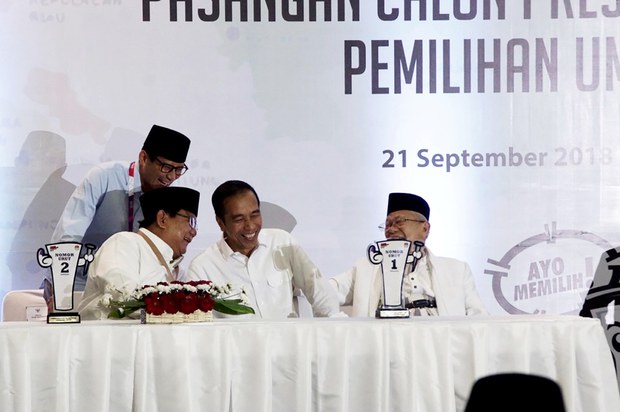Indonesia: Presidential Contender Pledges to Seek Close Ties with US, China
2018.11.21
Jakarta
 Indonesian presidential candidate Prabowo Subianto (seated, left), President Joko “Jokowi” Widodo (to his left), and their running mates share a laugh at the Central Election Building in Jakarta, Sept. 21, 2018.
Indonesian presidential candidate Prabowo Subianto (seated, left), President Joko “Jokowi” Widodo (to his left), and their running mates share a laugh at the Central Election Building in Jakarta, Sept. 21, 2018.
Indonesia’s opposition presidential candidate Prabowo Subianto said Wednesday he planned to seek close relationships with both the United States and China if elected, praising the two world powers for cultural influences and economic progress.
Prabowo, a former Army special forces commander, will face incumbent Joko “Jokowi” Widodo in the election scheduled for April 17, 2019.
“We want to be friends with both the United States and China. We have to respect both powers,” Prabowo said, speaking at the annual Indonesian Economic Forum in Jakarta.
The candidate said he believed that the United States had been “a benevolent world power.”
“There are instances of mistakes. Every imperial power experienced what we call over-extension, but let us be very objective,” he said.
“To be frank, most of us like Burger King, most of us wear jeans, we like rock and roll. This is the soft power of the United States,” he said.
Prabowo paid tribute to China’s influence on Indonesian culture and praised the country for its success in lifting millions of its people out of poverty.
Despite the tribute, Prabowo’s aides last month said that Indonesia might review China-backed infrastructure projects if elected.
“Some projects may be evaluated for necessity, but not necessarily be cancelled,” said Andre Rosiade, a spokesman for Prabowo’s Gerindra Party, responding to questions from BenarNews.
Jokowi’s stance
Jokowi has embraced China’s ambitious “One Belt, One Road” initiative and made upgrading the country’s infrastructure a priority during his first term in office.
Last year, Jokowi attended a two-day One Belt, One Road forum where Beijing laid out its plans to invest more than U.S. $1 trillion to build a network of ports, roads, railways and other logistics-related projects stretching through Southeast Asia, South Asia and beyond.
The president also sought closer economic relations with the United States.
A year after taking office in 2014, Jokowi made his first U.S. visit in an effort to formally raise bilateral ties to a strategic partnership.
‘Big-push strategy’
In Wednesday’s speech, Prabowo painted a bleak picture of Indonesia’s economy, likening it to an underfed person.
He said Indonesia must overcome significant challenges including a rising cost of living, rising government debt, stagnant growth at about 5 percent and rampant corruption. Politicians across the country, he added, had been caught red-handed accepting bribes.
Prabowo said his “big-push strategy” was aimed at turning Indonesia into a prosperous nation that was self-sufficient in providing food, energy and water to its people.
He cited indicators to show that Indonesia was lagging behind its Southeast Asian neighbors.
Indonesia’s tax revenue to gross domestic product ratio is 10.3 percent, much lower than neighboring countries Thailand, Malaysia and Singapore, he said.
Prabowo said he was open to foreign investment.
“To achieve food and energy self-sufficiency, we need science and technology from foreign countries,” he said.
Maintaining close ties with China and the United States would be in Indonesia’s interest because the two countries are global economic powers, according to Lana Soelistianingsih, an economist at the University of Indonesia.
“China dominates global trade and 30 percent of the world’s GDP comes from the United States. Whoever is elected president, I am sure he will maintain good relations,” she told BenarNews.
Lana said Indonesia should take advantage of a potential trade war between China and the United States to export products to both countries.
“For example, if China refuses a certain product from the United States, this is an opportunity for Indonesia to enter the Chinese market,” she said. “We must be creative in tapping this opportunity.”







